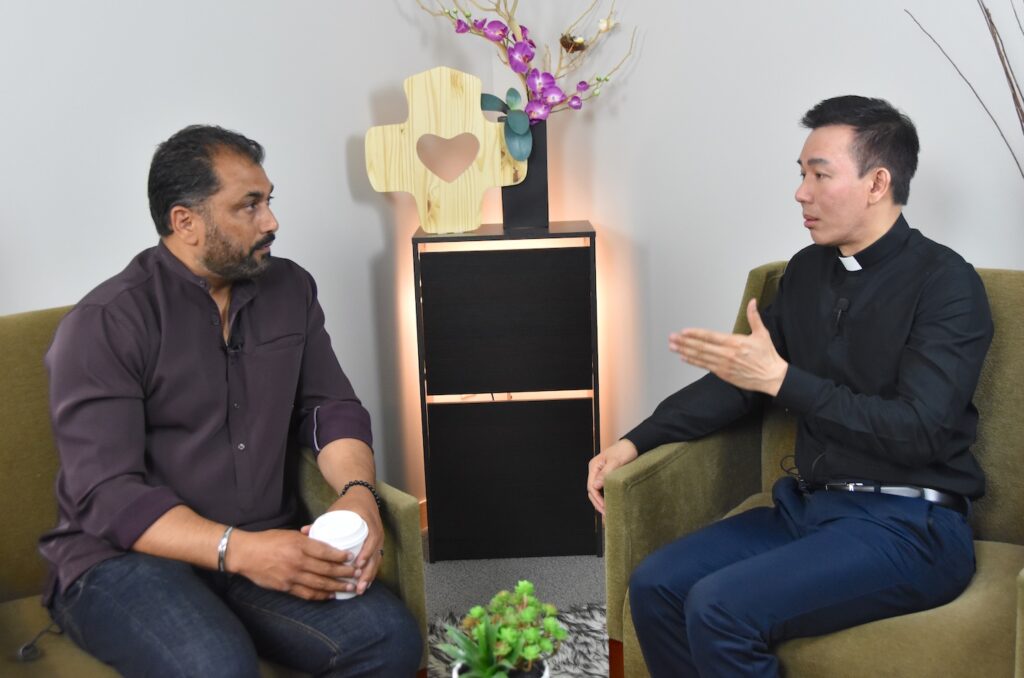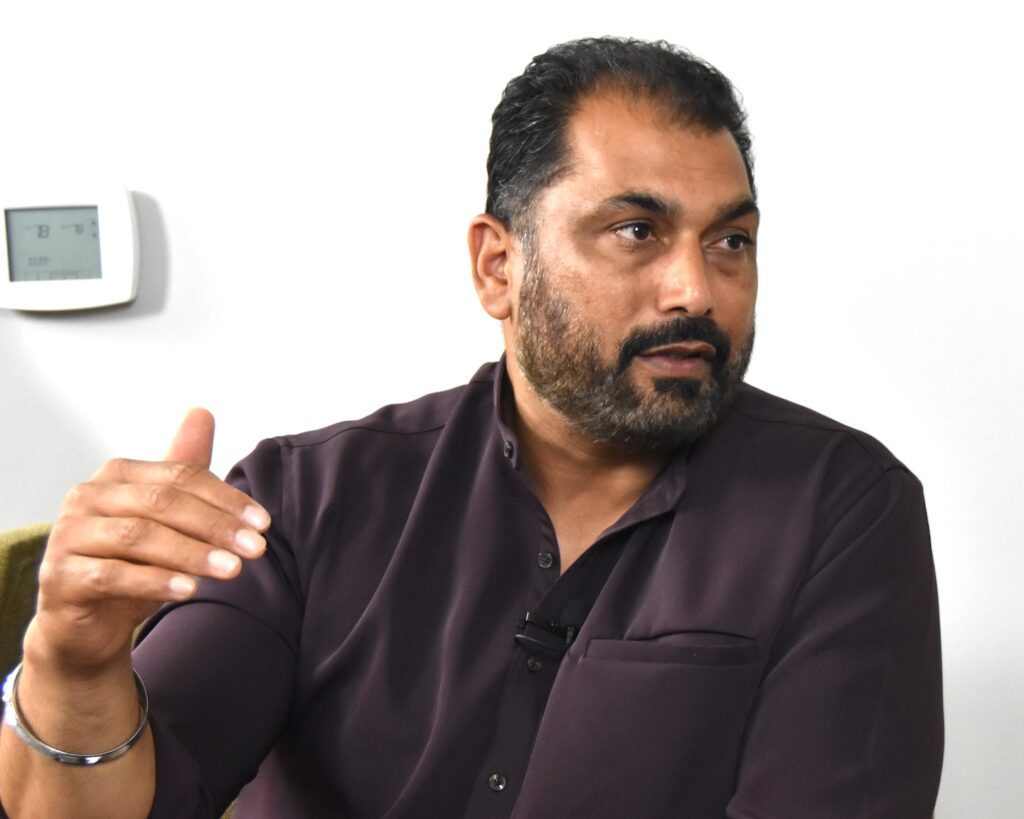“Be committed to what you want rather than what you are against”
Pardeep Singh Kaleka
Born in Punjab, India, Pardeep Singh Kaleka grew up in Milwaukee and as a young adult, served the city as a police officer and as a central city educator.
His life path changed dramatically on August 5, 2012, when a white supremacist opened fire on the Sikh Temple that his father –– Satwant Singh Kaleka –– had founded in suburban Milwaukee. The elder Kaleka was among those who died in the shooting.
Before the end of that day, Pardeep committed himself to finding a way to “use this horrific opportunity to go forward,” he said. “We should not be defined by what happens to us, but instead be defined by what we do.”
What Pardeep Singh Kaleka did was become a clinician who specializes in trauma care, treating survivors and perpetrators of violence. He befriended a former racist skinhead and wrote a book about their shared mission of fighting hate. In 2019, he was named executive director of the Interfaith Conference of Greater Milwaukee, and a year later, he became executive director of The Zeidler Group, a Milwaukee non-profit that promotes civil dialogue.
Pardeep’s message of love and reconciliation easily resonates with Dehonian spirituality. As we prepare to celebrate the feast of the Sacred Heart on June 24, we revisit Pardeep’s words about love and forgiveness, as well as a call to arm ourselves with compassion in the fight against violence. The following interview with Fr. Vien Nguyen, SCJ, was originally done as a part of the Heart to Heart video series.

An interview with Fr. Vien Nguyen and Pardeep Singh Kaleka
FR. VIEN NGUYEN, SCJ: Thank you very much for taking time to be with us. August 5, 2012, was a life-changing, life-shattering moment for you. Would you please tell us what happened?
PARDEEP SINGH KALEKA: August 5 was the day that seven people lost their lives at the Sikh Temple of Wisconsin at the hands of an affiliated white supremacist. It not only changed my life, but I think that it changed our community and the way that we look at hate in America. The seven people who lost their lives were first generation immigrants, all Sikhs. They were attending worship that morning, a morning that ended up being the deadliest hate crime committed by an affiliated white supremacist in a religious place in nearly 50 years.
We knew then that the work of the civil rights movement, of Dr. Martin Luther King, Jr., and all of us who do this work for social justice, was not complete. We asked ourselves, “How do we change not just policies and laws but hearts and minds and spirits?” That’s really been my work since then: to defy what happened that day with love, forgiveness, and compassion, and to work to bring about a more compassionate world.
We are honored to be engaged in that work with the Catholic community, the Lutheran community, Buddhists and Baha’i, Hindus, Muslims, the Jewish community –– the entire interfaith community. All people of faith are called to be there for people when they are hurting and to also commit to actions to heal that hurt.
FR. VIEN: Among those who died in the 2012 shooting was your dad. When did you say to yourself “I am going to commit myself to peace and justice and reconciliation and forgiveness?”
PARDEP: I think right away. That night I knew the work ahead of us had started that day and that I knew that my life was never going to be the same again. I could tell you a lot of things about what happened that day. The shooting started at 10:00 in morning. My father was the temple president, the founder of the temple; he was president for 15 years. For anyone who knows Sikh politics, that is a long time to be president, so you really have to be committed to building a community. I think that by August 5, 2012, he really had built a community on the south side of Milwaukee that welcomed people.
At the end of that day, the day of the shooting, we had to ask ourselves: “How do we stay committed to this work? How are we not defined by what happens to us but instead, be defined by what we do with this horrific opportunity to go forward?”
These are questions that needed to be answered by the broader community, not just by those immediately impacted by the shooting.
FR. VIEN: In your book [The Gift of Our Wounds: A Sikh and a Former White Supremacist Find Forgiveness After Hate], you attribute your healing to your family and religion. Many do not know the Sikh faith; can you share something about it?
PARDEEP: It originated in India about 500 years ago. Its beginnings are based in bringing equality and justice to our world, and speaking up on behalf of the community, for good.
There is a lot of Hindu, Islam, and other faiths woven into the teachings of Sikh and scriptures, though Sikh is a religion unto its own. If we can be virtuous, if we can be good people, we can be connected to the source, the embodiment of God here on earth.
The ultimate goal is to help and serve all of the community.

FR. VIEN: Acts of violence against people, against minorities as is currently taking place in the United States –– it is difficult to turn on the news each day to see a shooting, another act of violence committed. Do you get discouraged? Where do you get your source of inspiration?
PARDEEP: I do feel discouraged sometimes, but I find inspiration everywhere: in my faith, the faith of others, in our children. I find it when I look for it. When we think of happiness and sadness it’s not just that something good or bad has happened. A state of happiness means that you are able to see God in different moments, in different places.
When I search for hope, I start each day with prayer. I end each day with prayer. Prayer allows me to go to a deeper place. I get discouraged; I get down. Each one of these shootings is a gut punch. It reminds you that maybe you aren’t doing enough, maybe this society is doomed. But that’s when you find the genuine part of our relationship with God, the silver lining in the midst of grief and suffering. I call it a state of happiness and bliss in a state of chaos.
FR. VIEN: What have you learned about yourself through this tragedy?
PARDEEP: I learned that I really need community. We can say there are a lot of toxic people in the world who will stress you out. But there is a lot of connection. And I see that within different people. The human experience is a beautiful experience. As bad as our day may be, we must remember that each day that we are alive is a blissful day.
I am grateful. When the temple shooting happened, I think there was a part of me until that point that took life for granted. I had a middle class lifestyle. My wife and I traveled; we had beautiful children. It was the American dream. But there was a part of me that didn’t really have the enrichment that I feel now, the gratitude that I feel now wasn’t there. Now, I think of the experience of my four beautiful children. I genuinely love their personalities, I see different things, I see them navigating. As a parent you are always concerned about your kids. I think what has come from this is that I have a genuine appreciation for life and the way that community helps you navigate that life.
FR. VIEN: You co-founded Serve 2 Unite with Arno Michaelis, the former skinhead whom you wrote about. What would you like people to know about that?
PARDEEP: One of the things that we identified early on was the depth of suffering in our students. We would have a classroom or auditorium full of kids for our presentation and have 30 students saying “I want to hurt myself,” “I’m not doing good.” As we developed a program, we realized that we were really creating a way for people to navigate that harm, that hurt, that pain. We now teach that we are all ambassadors of healing: in the faith community, in the education community, in the corporate world. The work that we do at Serve 2 Unite and at Interfaith, the work that the Catholic community does here and abroad –– it continues our mission to be ambassadors of healing.
There is so much healing that needs to be done. Where to start? Just recommit yourself to the work of healing. Don’t be overwhelmed by it. You can easily be overwhelmed by pain and suffering, especially if you watch the news. Balance that by saying, “I appreciate the small things.” Appreciate life!
FR. VIEN: Do you have any new projects?
PARDEEP: I want to develop a safety protocol throughout the state to help communities know that we need relationships for safety. These relationships involve stakeholders such as schools, corporations, law enforcement, parents. You name it and everyone in that community needs to be proactive if we are going to prevent the next mass shooting. I am not saying this to scare anyone, but right now, there is probably someone who is at this moment making plans to hurt someone else.
I work with a lot of people who are former white supremacists, or people who were violent at some point in their lives. I have friends who were going to carry out harm against another community, but a single act of kindness got in the way and gave them pause. I think that we, as a society, want to be able to say, “How are you going to give somebody that pause? Do you really see that person?”
Part of the violence has to do with guns. Part has to do with what kind of ideology you have. But a lot of the violence has to do with rejection and how people, especially men, do not handle rejection well. The thing that I want to be able to institute is how do we build a less judgmental, less rejectionist society where compassion is more the rule? Acts of kindness and compassion are what have already kept a lot of shootings from happening.
FR. VIEN: Do you have any final thoughts for our interview?
PARDEEP: Practice your faith with a full heart. Be committed to what you want rather than what you are against. That’s not to say that you want to ignore what you are against, but it is a very exhausting existence if you always define yourself by what you are a fighting against rather than what you are fighting for.
As a religious community based in the Sacred Heart, I thank you for fighting on behalf of love.
Remembering, ten years later
This year marks the 10th anniversary of the attack on the Sikh Temple of Wisconsin. The temple, located in Oak Creek, WI, will have events from August 5-7 to commemorate the anniversary. The public is welcome to join them. Click here to visit the temple’s website and learn more.

